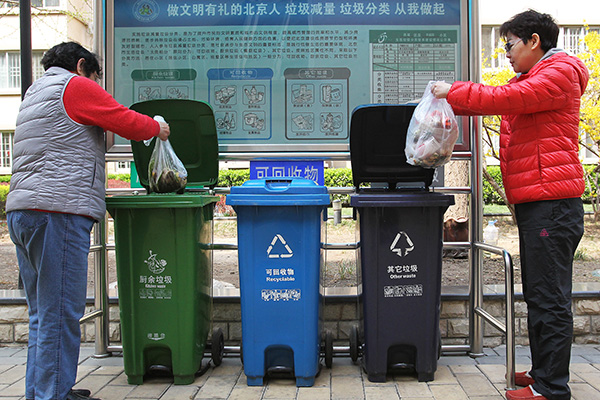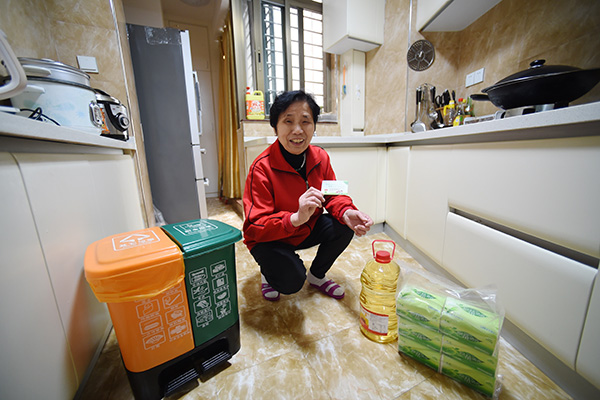
People dispose of trash in Beijing’s Fengrongyuan residential community.[Photo/China Daily]
New measures have been announced that will require government offices, restaurants and businesses in 46 major cities to sort and separate all household trash, including hazardous waste, kitchen leftovers and recyclable materials, by 2020.
The aim is to reduce the environmental risks posed by growing piles of waste in landfills and public places.
By the end of the year, the cities will be required to issue plans listing the types of waste they will deal with, and formulate plans for transportation and processing, according to Feng Liang, a senior official for resource conservation and environmental protection at the National Development and Reform Commission.
By the end of the decade, the recycling rate for household waste will have risen to at least 35 percent of the national total, he said. The commission, China’s top economic planner, and the Ministry of Housing and Urban-Rural Development have issued the action plan to achieve the target.

A resident of Xiamen, Fujian province, displays a credit coupon she received for sorting her household trash. The coupon can be exchanged for household items.[Photo/Xinhua]
The move has been warmly welcomed by environmental experts, businesses and other commentators because it is the first time mandatory regulations on the disposal of household trash have been levied at the national level. That illustrates the government’s commitment to improving the situation, they said.
Growing awareness
Calls for the classification of waste have become louder in recent years, especially because many cities are surrounded by growing mountains of trash as a result of China’s rapid economic development.
For decades, household trash has been processed by burying or burning. In 2015, the amount buried or burned accounted for 92 percent of the total volume generated in cities nationwide, according to data from the National Bureau of Statistics.
However, many landfills are now full or nearing capacity, and some processing plants are overloaded, including those in cities included in the plan.
This month, the results of environmental inspections conducted last year on behalf of the State Council, China’s Cabinet, were released. The inspectors assessed conditions at Beijing’s waste processing plants, and discovered that 11 of the city’s 21 facilities are overburdened, according to a statement issued by the Ministry of Environmental Protection.
The inspectors also reported violations of the regulations related to household waste, including random and illegal dumping.
In July, cargo vessels were found to be illegally transporting and dumping household trash from Shanghai in areas close to Tianhu Lake in Jiangsu province.
“Trash-sorting should be introduced as soon as possible, because it would improve burning efficiency and reduce residue,” said Xue Tao, executive head of the E20 Institute, an environmental think tank that has partnered with Peking University’s College of Environmental Sciences and Engineering to start a research platform for businesses in the sector.
Most important, rapid introduction would raise public awareness of environmental protection and help reduce the amount of trash generated by households, he added.
Utilization measures
Since 2010, the National Development and Reform Commission has overseen pilot measures to avoid burying or burning by utilizing kitchen waste as compost or to produce methane.
Restaurants in pilot cities are required to either process waste themselves or hand it over to local governments for processing.
So far, 100 major cities have been listed as pilots and have established composting and processing plants, aided by more than 2 billion yuan ($290 million) provided by the commission, according to statements it published last year.
“The authorities have pushed forward these projects to control the illegal use of recycled cooking oil, known as ‘gutter oil’,” said Xue, referring to the illegal practice of retrieving used oil from drains and bins and recycling it for further use. He added that most of the recycling projects approved by the authorities use waste to produce methane via anaerobic fermentation. The gas is then used to generate electricity.
E20’s analysis of the market for household waste shows that the amount generated is rising by 10 percent every year, and is expected to reach more than 48 million metric tons by 2020.
That growth is providing opportunities for processing companies.
“Encouraged by preferential policies and a huge injection of funds, the domestic market for kitchen waste has soared,” Ren Lianhai, a professor of environmental science at the Beijing Technology and Business University, said at a forum on the treatment of solid waste in December.
“The developing industry has helped to reduce the amount of gutter oil being processed, and also improved food security.”
For example, Changzhou in Jiangsu province has processed more than 140,000 tons of kitchen waste since May 2012, while the government of Jinhua, Zhejiang province, collects almost all the waste generated by more than 3,400 restaurants and canteens at schools and government buildings in its downtown districts.
